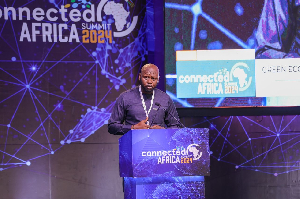- Home - News
- TWI News | TV
- Polls
- Year In Review
- News Archive
- Crime & Punishment
- Politics
- Regional
- Editorial
- Health
- Ghanaians Abroad
- Tabloid
- Africa
- Religion
- Election 2020
- Coronavirus
- News Videos | TV
- Photo Archives
- News Headlines
- Press Release
Press Releases of Saturday, 27 April 2024
Source: GIFEC
GIFEC CEO Prince Ofosu Sefah delivers keynote address on e-Waste at Connected Africa Summit in Nairobi
At the ongoing Connected Africa Summit 2024, the Administrator (CEO) of Ghana Investment Fund for Electronic Communications (GIFEC), Mr. Prince Ofosu Sefah, representing the Hon. Deputy Minister of Communications and Digitalization Designate, Mr. Charles Acheampong, highlighted the need for accelerated efforts and collaboration to advance e-Waste management in Africa.
In his keynote address, the Administrator underscored the remarkable opportunities for economic development emerging from the unprecedented surge in the adoption of technology, fueled by the rapid expansion of mobile connectivity and the increasing penetration of Internet services.
He, however, also highlighted the challenges in effectively managing the resultant electronic waste, emphasizing the need for more effective strategic management.
Mr. Sefah drew attention especially to the risks faced by millions of women and child laborers working in the informal recycling sector worldwide, urging strategic interventions to mitigate e-waste exposure.
He revealed that in Ghana, pursuant to the e-Waste Act, an e-Waste Fund has been established with the mandate of overseeing funds set aside for the management of e-Waste in Ghana.
According to him, the Fund is to invest in the development of infrastructure and capacity-building initiatives that enable the safe collection, transportation, and recycling of e-waste.
Furthermore, he said that the Ministry of Communications and Digitalization, through GIFEC, is collaborating with the e-Waste Fund to leverage GIFEC’s extensive network of Community ICT Centers (CICs) to establish convenient collection points for electronic waste across various communities in Ghana.
This alliance, he posits, presents a unique and innovative opportunity to address the environmental challenges posed by e-Waste while simultaneously enhancing the accessibility of disposal options, and more importantly, awareness creation on e-Waste for communities across Ghana.
Mr. Sefah, in conclusion, called on all relevant stakeholders to join forces, especially through regulatory harmonization and sensitization of citizens, to better manage the challenge of e-Waste management and rather realize its great potential benefits in Africa.











